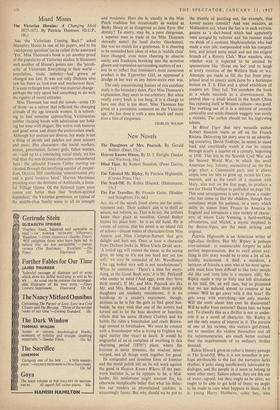Mixed Misses
ARE the Victorians Coming Back?' asked Humphry House in one of his papers, and to his `catchpenny question' (as he called it) he answered 'Yes.' Miss Thomson's book is yet another proof of the popularity of Victorian studies. It illustrates well another of House's points too : the `peculi- arity' of Victorians. Everything in their world— population, trade, industry—had grown or changed too fast. It was not only Dickens who saw his times as 'cast-iron and mechanical days.' It is easy to forget how swift was material change: perhaps the very speed had something to do with the rigidity of moral attitudes.
Miss Thomson has used the novels—some 120 of them—as a mirror that reflected the changing attitude of the age towards women. It is refresh- ing to find someone approaching Victorianism neither clasping hands with admiration nor hold- ing her nose with disgust. She writes with humour and good sense and shuns the exclamation mark. Although her sources are diverse, her study is not a thing of shreds and patches nor even scissors and paste. Her characters—the social workers, nurses, governesses, factory girls, fallen women, etc.—add up to a convincing social study, no less real than the non-fictional characters remembered here : the splendid Frances Cobbe moving un- daunted through the terrifying squalor of pauper- dom, Octavia Hill combining 'unsentimental pity and a good business head,' Harriet Martifieau presiding over the destinies of Ambleside, a force- ful Village Queen. Of the fictional types none comes out better than that 'broken-spirited dependant,' the Victorian governess, so typical of the middle-class family scene in all its strength
and weakness. Here she is, usually in the Miss Pinch tradition but occasionally as wicked as Becky Sharp or as dangerous as Jane Eyre. Her destiny? To marry, may be, a poor clergyman, a superior man in trade or (as Miss Thomson shrewdly notes) the local doctor (Sawbones). She was no match, for a gentleman. It is cheering to be reminded how ideas of what is 'middle class' have changed; even more cheering to observe sanity and frankness breaking into the secretive gloom and repression surrounding matters of sex : less so to reflect that feminism's most numerous product is the Typewriter Girl, as oppressed a drudge in her way as any below-stairs ever was.
The only unconvincing feature of this excellent study is the boundary dates. Pace Miss Thomson's explanation, they seem to me arbitrary. But when nearly every book is too long, it is a change to have one that is too short. Miss Thomson has given us a perceptive comment on the Victorian age; she has done it with a sure touch and more than a hint of eloquence.
CHARLES WILSON


































 Previous page
Previous page